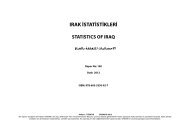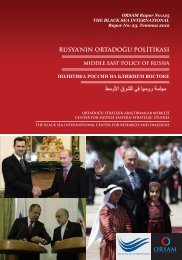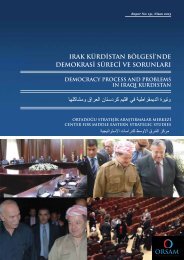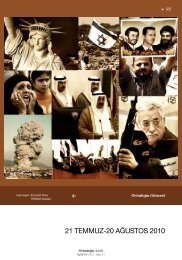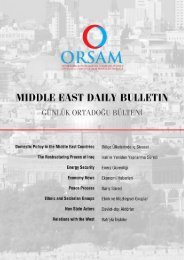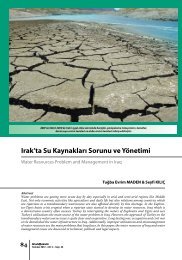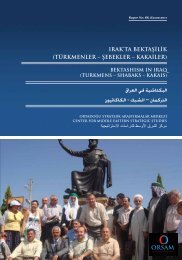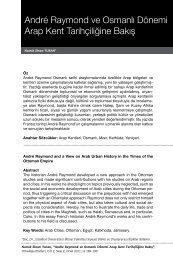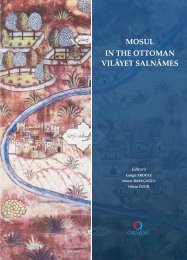turkmen in iraq and their flight - orsam
turkmen in iraq and their flight - orsam
turkmen in iraq and their flight - orsam
You also want an ePaper? Increase the reach of your titles
YUMPU automatically turns print PDFs into web optimized ePapers that Google loves.
Preface<br />
The <strong>in</strong>vasion of Iraq has aggravated ethnic <strong>and</strong> m<strong>in</strong>ority issues <strong>in</strong> the country. Like most other countries <strong>in</strong> the<br />
region, Iraq accommodates multiple ethnic <strong>and</strong> religious groups each of which has claims often clash<strong>in</strong>g with<br />
the others. Perhaps most known of such conflicts revolves around the Kurdish claims. Nevertheless, these<br />
conflicts have roots go<strong>in</strong>g back to early 20 th century <strong>and</strong> perhaps even further back. Turkmen <strong>in</strong> Iraq have<br />
been a great concern for successive Turkish governments <strong>and</strong> thus often <strong>in</strong>fluenced Turkey’s <strong>in</strong>ternational<br />
politics <strong>and</strong> affairs.<br />
In this complex web of relations <strong>and</strong> <strong>in</strong>terests over the Middle East, demography is often part of the problem<br />
as well as the solution. Population eng<strong>in</strong>eer<strong>in</strong>g is not unknown to nations across the globe, but perhaps <strong>in</strong><br />
the second half of the last century, Iraqi m<strong>in</strong>orities saw one of the most brutal treatments amount<strong>in</strong>g to ethnic<br />
cleans<strong>in</strong>g. The Kurds, as the largest ethnic m<strong>in</strong>ority <strong>in</strong> Iraq suffered terribly from Saddam’s cruelty over<br />
decades <strong>and</strong> mass kill<strong>in</strong>gs attracted world’s attention to an extent. Turkmen <strong>and</strong> the other m<strong>in</strong>orities <strong>in</strong> Iraq,<br />
despite be<strong>in</strong>g sizeable, have not attracted much <strong>in</strong>terest from the <strong>in</strong>ternational public. Nevertheless, they had<br />
suffered from the same ethnic cleans<strong>in</strong>g policies.<br />
In the new Iraq, by the recipes of the US <strong>and</strong> the allies, major ethnic <strong>and</strong> religious groups ga<strong>in</strong>ed some remarkable<br />
representation. S<strong>in</strong>gle party nature of Iraqi politics turned <strong>in</strong>to a largely fragmented wonderl<strong>and</strong> of<br />
religious <strong>and</strong> ethnic parties. Aga<strong>in</strong> smaller groups such as Turkmen <strong>and</strong> Assyrians were not lucky enough to<br />
get proportionate representation <strong>and</strong> often jo<strong>in</strong>ed <strong>in</strong> other groups. However, the dispute over Kirkuk <strong>and</strong> oil<br />
reserves <strong>in</strong> the North, <strong>in</strong> a way, br<strong>in</strong>gs Turkmen back on the agenda. This is perhaps largely due to Turkey’s<br />
excessive emphasis on Turkmen <strong>and</strong> Kurdish issue <strong>in</strong> Iraq.<br />
Analys<strong>in</strong>g Turkmen population movements was an <strong>in</strong>terest<strong>in</strong>g task for two reasons: First, due to <strong>their</strong> relatively<br />
small population size was mak<strong>in</strong>g Turkmen disadvantaged aga<strong>in</strong>st Arabs <strong>and</strong> Kurds <strong>and</strong> so far <strong>in</strong> restructur<strong>in</strong>g<br />
Iraq, we have seen evidence that they suffer from representation problems. Secondly, as a case,<br />
it offers opportunities to underst<strong>and</strong> <strong>and</strong> prepare for similar conflict situations <strong>and</strong> m<strong>in</strong>ority issues <strong>in</strong>volved<br />
<strong>in</strong> such conflicts. This research was conceived <strong>in</strong> reaction to the chaos <strong>and</strong> turbulence <strong>in</strong> Iraq follow<strong>in</strong>g the<br />
<strong>in</strong>vasion by the USA <strong>and</strong> coalition forces <strong>in</strong> 2003.<br />
The two surveys form<strong>in</strong>g the basis for this book were conducted <strong>in</strong> 2004. We have surveyed about 1500<br />
households <strong>in</strong> selected cities <strong>and</strong> towns of Iraq <strong>in</strong>clud<strong>in</strong>g Baghdad, Kirkuk, Musul <strong>and</strong> Erbil. To underst<strong>and</strong><br />
the receiv<strong>in</strong>g end of the migration process, we have also conducted a questionnaire survey simultaneously <strong>in</strong><br />
Turkey target<strong>in</strong>g Iraqi Turkmen immigrants <strong>in</strong> major cities <strong>in</strong>clud<strong>in</strong>g Istanbul, Ankara <strong>and</strong> Izmir. For neither of<br />
the surveys, we can claim representativeness due to absence of any population frames from which we can<br />
draw samples. However, the two surveys provided a rich data set which is at least useful for a better underst<strong>and</strong><strong>in</strong>g<br />
of Turkmen <strong>in</strong>ternational migration patterns <strong>and</strong> experiences.<br />
Thus <strong>in</strong> this book, we aimed to offer a comprehensive account of Iraqi Turkmen <strong>in</strong>ternational migration at the<br />
turn of the century. Given there are no other studies on Iraqi Turkmen, this study is also the first ever analysis<br />
of this particular population <strong>and</strong> presents some broader socioeconomic characteristics. A chapter based on<br />
a first ever analysis of Iraqi migration is also added to complete the picture <strong>and</strong> place the Turkmen case <strong>in</strong><br />
its country context.<br />
These surveys, analysis <strong>and</strong> eventually this publication was only possible with the assistance of certa<strong>in</strong> key<br />
people <strong>and</strong> an organised effort of over 60 field workers <strong>and</strong> logistic support of others. Of course, I am first of<br />
all grateful to all those Turkmen <strong>in</strong> Iraq <strong>and</strong> Turkey who not only spared <strong>their</strong> time to answer our questions <strong>and</strong><br />
helped us to locate other respondents. Personally, I would like to thank to all those who generously supported<br />
this study <strong>and</strong> all voluntary Turkmen students who worked for the project <strong>and</strong> went to Iraq <strong>and</strong> travelled several<br />
cities to conduct face to face <strong>in</strong>terviews with Turkmen families.<br />
İbrahim Sirkeci<br />
2011, London




